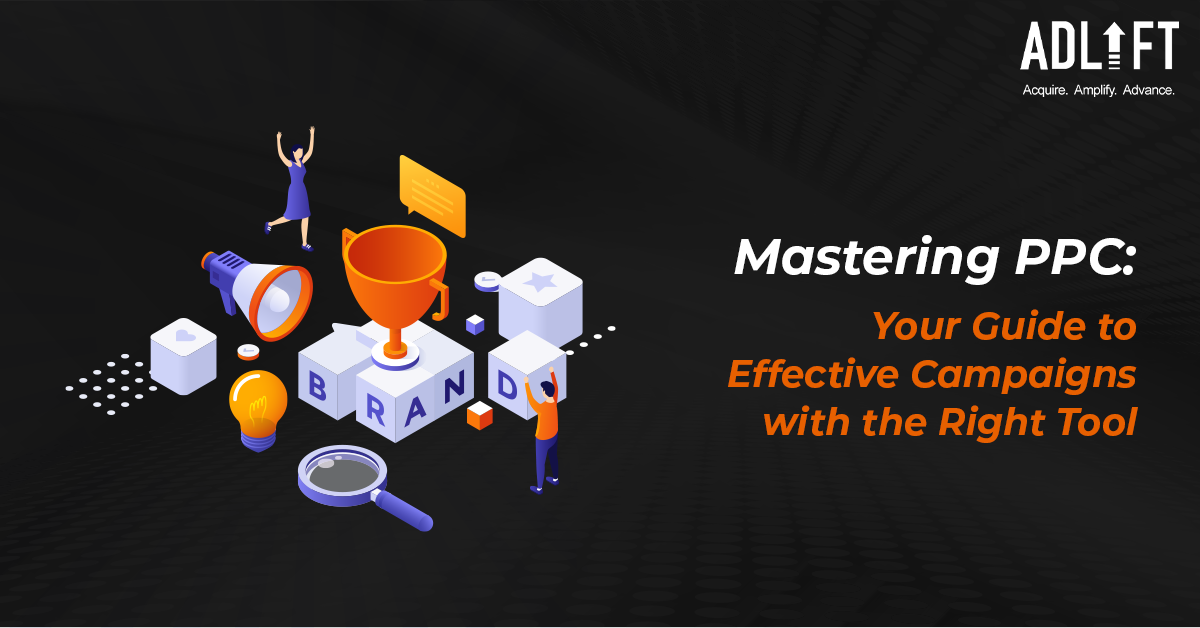Mastering PPC: Your Guide to Effective Campaigns with the Right Tool

The era that is marked by fierce competition and shortened attention spans, businesses heavily rely on Pay-Per-Click (PPC) advertising. This powerful PPC tool enables businesses to effectively engage their target audience and ultimately elevate conversion rates. Nevertheless, achieving success in PPC campaigns surpasses mere budget allocation and keyword selection. That being said, in order to truly excel in this domain and yield a remarkable return on investment (ROI), you must equip yourself with a comprehensive set of PPC tools.
Welcome to our comprehensive guide to mastering PPC campaigns with the best PPC tools. This informative blog explores the ever-evolving world of PPC advertising, breaks down crucial elements of a successful campaign, and underscores the profound impact that PPC tool selection can have on your efforts.
Whether you have abundant experience in digital marketing or are just starting your journey, this blog aims to equip you with essential knowledge for effectively navigating the realm of paid advertising. So get ready as we embark on a journey to explore how leveraging the best PPC tools can be indispensable in this endeavor.
Unleashing the Power of PPC Advertising
PPC, as the name suggests, is a model where you pay every time your ad is clicked. Unlike traditional advertising, where you pay for visibility, PPC ensures that you only pay for actual interactions. This model offers multiple advantages:
- Immediate Traffic: Unlike SEO, which takes time, paid search tools can generate traffic immediately once set up.
- Targeted Advertising: PPC allows for niche targeting based on demographics, interests, and behaviors.
- Flexible Budgeting: Decide how much you’re willing to spend daily and avoid exceeding that limit.
How to Select the Right PPC Tool?
The foundation of a successful PPC campaign is selecting the right PPC tool. Here’s what you should consider:
- Usability: An ideal pay per click tool should have an intuitive interface, ensuring users spend less time grappling with complexities and more time on campaign optimization. An easily navigable PPC tool enhances efficiency and productivity.
- Integration Capabilities: A standalone PPC tool can be limiting. Therefore, try and opt for a PPC tool that seamlessly integrates with other software and platforms you already utilize. This holistic approach ensures all your data and strategies are in sync, offering a unified marketing solution.
- Reporting: The real power lies in actionable insights. The chosen PPC tool should offer comprehensive analytics, shedding light on every facet of your campaign’s performance. From click-through rates to conversion metrics, a detailed report can be the roadmap to refine strategies.
- Support: A responsive support team that’s prompt and knowledgeable can be the safety net that prevents minor issues from escalating into significant setbacks.
- Cost: While it’s tempting to opt for feature-packed PPC management tools, it’s essential to assess whether the PPC tool aligns with your budget and offers a favorable ROI.
Popular paid search tools include Google Ads, Microsoft Advertising (formerly Bing Ads), and SEMrush, among others.
Setting Up PPC Campaigns
Initiating a PPC campaign involves several steps:
- Define Your Goals: Whether it’s increasing sales, generating leads, or driving website traffic, clear objectives guide your strategies.
- Research Your Audience: Understand who your customers are, their behaviors, and their interests.
- Structure Your Campaign: Divide campaigns based on product lines or services. Under each campaign, have specific ad groups with related keywords.
- Craft Compelling Ad Copies: Ensure that the ads resonate with your target audience and have a clear call-to-action.
- Landing Page Relevance: Direct users to a relevant page that matches the content of your ad.
Implementing Effective Keyword Strategies with Pay Per Click Tools
Keywords form the backbone of PPC. Here’s how to ace your keyword game using essential PPC management tools:
- Start Broad, then Refine: Begin with a broad list, then whittle it down based on performance.
- Use Keyword Tools: Platforms like Google’s Keyword Planner can provide insights into search volume and competition.
- Stay Updated: Trends change. Therefore, regularly revisit and update your keyword list.
How to Monitor and Optimize Campaign Performance
Monitoring campaigns is not a one-time affair. Regular reviews ensure optimal performance.
- Analyze Click-Through Rates (CTR): A low CTR might mean your ad is not resonating.
- Check Conversion Rates: High traffic but low conversions indicate a disconnect, perhaps on the landing page.
- Monitor Quality Score: Platforms like Google Ads rate your keywords based on relevance. A high score can lead to lower costs and better ad positions.
- A/B Testing: Test variations of your ads to see which performs better.
Budget Management and ROI Tracking
In the dynamic world of PPC advertising, vigilance in budget management and ROI tracking is paramount. Efficiently allocating resources can be the difference between a thriving campaign and a costly misstep.
- Set Daily/Monthly Budgets: By pre-defining your spending limits, you safeguard against unexpected expenses.
- Measure Cost-per-click (CPC): Regularly monitoring your CPC is crucial. It’s not just about getting clicks; it’s about ensuring those clicks are cost-effective.
- Calculate Return on Ad Spend (ROAS): Beyond clicks and impressions, the real indicator of a campaign’s success lies in its ROI. A positive ROAS indicates a campaign that’s not just driving traffic but also effectively converting that traffic into substantial returns.
Unlock Your PPC Potential with Expert Guidance
Mastering PPC involves not just setting up campaigns but consistently refining and optimizing them for better results. By selecting the optimum PPC tools, implementing effective strategies, and continuously monitoring performance, you can harness the full power of PPC advertising.
With AdLift by your side, you get the insights to navigate the challenges and seize the opportunities. The road to PPC expertise may have its challenges, but the rewards in terms of conversions and ROI make the journey worthwhile. Partner with AdLift today and uplift your digital advertising game.
